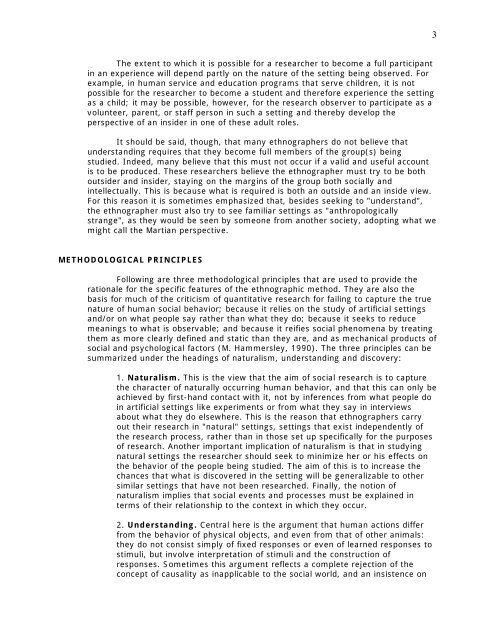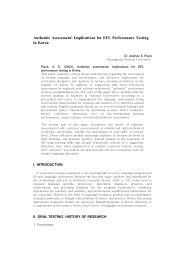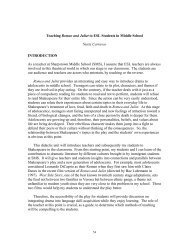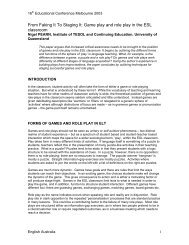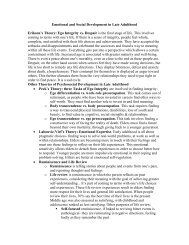A SYNTHESIS OF ETHNOGRAPHIC RESEARCH BY: MICHAEL ...
A SYNTHESIS OF ETHNOGRAPHIC RESEARCH BY: MICHAEL ...
A SYNTHESIS OF ETHNOGRAPHIC RESEARCH BY: MICHAEL ...
Create successful ePaper yourself
Turn your PDF publications into a flip-book with our unique Google optimized e-Paper software.
3The extent to which it is possible for a researcher to become a full participantin an experience will depend partly on the nature of the setting being observed. Forexample, in human service and education programs that serve children, it is notpossible for the researcher to become a student and therefore experience the settingas a child; it may be possible, however, for the research observer to participate as avolunteer, parent, or staff person in such a setting and thereby develop theperspective of an insider in one of these adult roles.It should be said, though, that many ethnographers do not believe thatunderstanding requires that they become full members of the group(s) beingstudied. Indeed, many believe that this must not occur if a valid and useful accountis to be produced. These researchers believe the ethnographer must try to be bothoutsider and insider, staying on the margins of the group both socially andintellectually. This is because what is required is both an outside and an inside view.For this reason it is sometimes emphasized that, besides seeking to "understand",the ethnographer must also try to see familiar settings as "anthropologicallystrange", as they would be seen by someone from another society, adopting what wemight call the Martian perspective.METHODOLOGICAL PRINCIPLESFollowing are three methodological principles that are used to provide therationale for the specific features of the ethnographic method. They are also thebasis for much of the criticism of quantitative research for failing to capture the truenature of human social behavior; because it relies on the study of artificial settingsand/or on what people say rather than what they do; because it seeks to reducemeanings to what is observable; and because it reifies social phenomena by treatingthem as more clearly defined and static than they are, and as mechanical products ofsocial and psychological factors (M. Hammersley, 1990). The three principles can besummarized under the headings of naturalism, understanding and discovery:1. Naturalism. This is the view that the aim of social research is to capturethe character of naturally occurring human behavior, and that this can only beachieved by first-hand contact with it, not by inferences from what people doin artificial settings like experiments or from what they say in interviewsabout what they do elsewhere. This is the reason that ethnographers carryout their research in "natural" settings, settings that exist independently ofthe research process, rather than in those set up specifically for the purposesof research. Another important implication of naturalism is that in studyingnatural settings the researcher should seek to minimize her or his effects onthe behavior of the people being studied. The aim of this is to increase thechances that what is discovered in the setting will be generalizable to othersimilar settings that have not been researched. Finally, the notion ofnaturalism implies that social events and processes must be explained interms of their relationship to the context in which they occur.2. Understanding. Central here is the argument that human actions differfrom the behavior of physical objects, and even from that of other animals:they do not consist simply of fixed responses or even of learned responses tostimuli, but involve interpretation of stimuli and the construction ofresponses. Sometimes this argument reflects a complete rejection of theconcept of causality as inapplicable to the social world, and an insistence on


